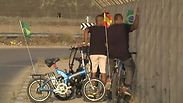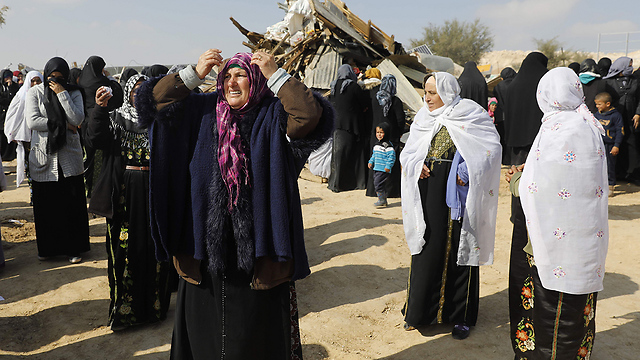
Jisr az-Zarqa. Has Netanyahu ever visited one of Israel’s most neglected communities?
Photo: Ido Erez

Tami Arad
Photo: Gabriel Baharalia

Being a second-class citizen in Israel
Op-ed: Israel’s Arabs have never been a top priority for Israel’s governments throughout the generations, and the current government is making no actual effort to change that approach; the residents of Umm al-Hiran feel like second-class citizens, deprived compared to their Jewish compatriots.
The police’s insistence to hold on to the body of Yaqoub Moussa Abu al-Qiyan, until it was released for burial following a High Court order, does not indicate a mishap or insensitivity, but a common perception, not to mention prejudice. It wouldn’t be baseless to say that had he been a Jewish terrorist, his body would have been released for burial shortly after the incident and the police would not have imposed restrictions on the acceptable mourning ceremonies.
Even after an examination by the Police Internal Investigations Department and the autopsy findings, it will be hard to determine for certain what made a family man, a teacher, run over a police officer. What can be determined for certain is that the feeling of deprivation of the Bedouins, as well as all of Israel’s Arab citizens, did not begin at Umm al-Hiran and will not end there.
In the Umm al-Hiran case, it seems that the state did show lenience and did meet the residents’ half way, yet all that was left of the good will was a vehicular attack, according to the police, and unjustified shooting which led to an accident, according to the family. This war of versions comes down to a reference which was not noted in al-Qiyan’s Israeli identity card, but is engraved in the heart of the identity of Israel’s Arab citizens – “second-class citizens.” That is the feeling of the Umm al-Hiran residents who refused to evacuate, and that is also the feeling of those who chose to evacuate.
The deprivation of Israel’s Arab citizens compared to its Jewish citizens became an axiom a long time ago. According to the findings of a study conducted by the Dirasat Institute, the Arab center for Law and Policy, hundreds of Jewish communities have been established since the state’s inception and not a single Arab community, apart from the seven Bedouin villages in the Negev; the number of Arabs in Israel is seven times bigger than in 1948, while the municipal area they reside on remained unchanged; one-quarter of the Arab communities have no master plans, so their residents cannot receive building permits, and in the communities where master plans have been approved – the building permits are delayed due to lack of infrastructure.
Even if the findings are incomplete, or inaccurate, they point to an approach. Israel’s Arabs have never been a top priority for Israel’s governments throughout the generations, and the current government, with the commander’s spirit proudly marching after the slogan “The Arabs are heading to the polling stations in droves,” is making no actual effort to change that approach. Every weekend, Prime Minister Benjamin Netanyahu passes by Jisr az-Zarqa, a stone’s throw away from his Caesarea home, one of the poorest and most neglected communities in Israel. I don’t know if Netanyahu ever visited that place, but if he has – his impression is imperceptible.
Like Jisr az-Zarqa, many communities in the Arab sector suffer from distress and neglect. The Knesset members of the Joint List, who claim to represent the Israeli Arabs’ distress, showed up in Umm al-Hiran in the middle of the night because they smelled a provocation. From their mouths, a protest against deprivation always receives a Palestinian nationalistic touch. Large parts of the public will identify with the deprivation of their Arab neighbor and condemn racist comments against him, but those same citizens will find it difficult to identify with him when he raises the Palestinian Authority’s flag. It’s not unintentionally that the Druze leadership has made an effort to distinguish itself from the Israeli Arabs’ protest, but the tensions there are high as well. One of the demolition orders issued in the village of Maghar belongs to the son of a major in the IDF who was killed in Lebanon. The community leaders announced a protest strike in the local authorities and were planning a huge protest in Maghar.
The prime minister’s comments on equal enforcement – both in Amona and in Maghar – are justified but require discretion and sensitivity. The statement aims to please the settlers, but in the meantime the Amona settlers have stopped playing by the rules over Netanyahu’s head, while tens of thousands of distressed citizens in the Arab sector have no one to turn to.
















